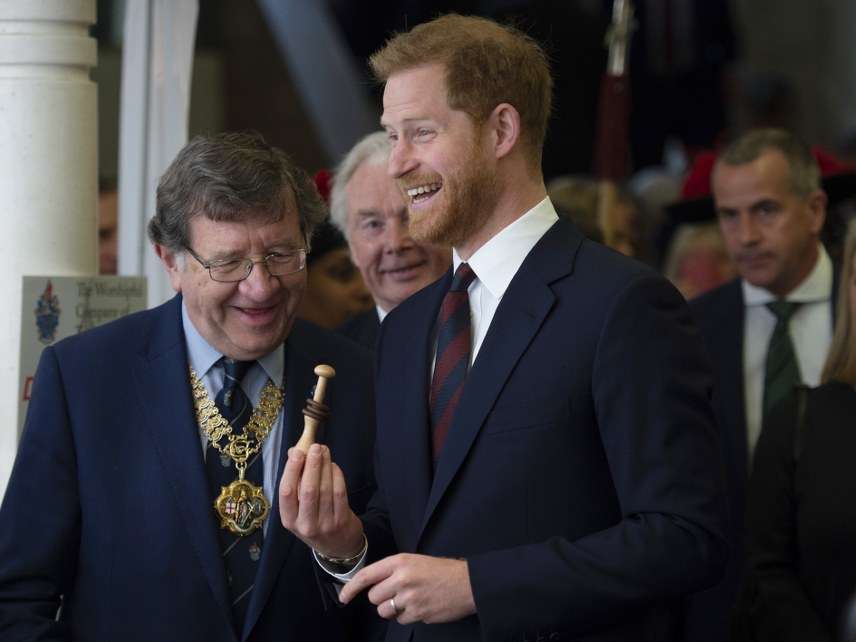Prince Harry Blames Fortnite Addiction, Social Media for the World's Ills
Maybe people are just playing to escape all the Brexit news?

The United Kingdom's government is in the midst of a bit of a disaster. The citizens voted in favor of Brexit—of ending the country's membership in the European Union. Their political leaders, especially Prime Minister , have not been able to come to a consensus on how to actually navigate leaving.
The Brexit mess has progressed (or failed to progress) to the point that Prime Minister Theresa May even offered to resign if Parliament approved a plan, and it refused even then. May can't even successfully resign in disgrace.
But never mind all of that. According to Prince Harry, Duke of Sussex, the big problems in England are the popular video game Fortnite and addiction to social media.
In a rant Thursday at a YMCA in West London, Harry blamed Fortnite for video game addiction and said it should be banned.
"That game shouldn't be allowed. Where is the benefit of having it in your household?," he said, according to the BBC. "It's created to addict, an addiction to keep you in front of a computer for as long as possible. It's so irresponsible….It's like waiting for the damage to be done and kids turning up on your doorsteps and families being broken down."
This is very familiar, and very tiresome. The history of video games is full of complaints essentially identical to Harry's, just with the name of the game changed. We've seen it going all the way back to Space Invaders and Pac-Man.
Few people are spending their days in neon blue mazes fleeing ghosts and hunting for random pieces of fruit to eat. There is no memorial to the millions who succumbed to "Pac-Man Fever." Yet even now, some cultural critics still describe Pac-Man as though it had been a real-world cultural threat based on anecdotal stories from a bygone age.
Fortnite is very popular, earning $2.4 billion in revenue for publisher Epic Games and boasting about 250 million players. It's not out of line to call it currently the most popular video game in the world. It's definitely the Pac-Man of 2019.
It is "addictive" in the sense that people like to play it and are playing it a whole lot. Some of these people are children and others with little self-control, and so they're playing it for hours on end. The history of video games shows us that people will not be playing Fortnite for hours on end forever; eventually they will move on to other games or hobbies.
The BBC also calls video games a "booming" industry, as though the growth is a new thing, in order to somehow make Fortnite appear to be a novel phenomenon and not a game following typical trends of popularity. Video games have been a remarkably popular part of culture ever since they were introduced. They're earning more money for the same reasons the movie industry is earning more money: They are growing more technologically accessible and are increasingly available worldwide to larger audiences at reasonable prices.
That some people might choose video games over other options and even over family interactions has been forever treated as a symptom of addiction, but those who are actually study video game addiction say they see such problems in less than 2 percent of players. Even the BBC, while giving Prince Harry a platform to declare that Fortnite is designed to "create" addiction, notes a recent study showing a mere .3 percent of gamers having trouble controlling the amount of time playing games. As one professor, Andrew Przybylski of the Oxford Internet Institute, explains, people who play games for long lengths of times may be doing so as a coping mechanism. It probably wasn't Fortnite that destroyed a person's marriage; more likely, it was the relationship problems he or she tried to avoid by playing instead.
Prince Harry's comments are typical of a different kind of cultural addiction: an addiction to demanding that the government make tough decisions that are supposed to be handled by parents. Prince Harry is about to become a dad, and he's essentially complaining about the challenges of taking responsibility for raising a child. In the U.K., this demand that government make parenting decisions has led to everything from advertising bans on any food the government declares to be unhealthy (just about everything) to the possibility of total portion control of what British people can eat.
The good news for Prince Harry is that by the time his kid is old enough to play games, the culture will have likely moved on to something besides Fortnite. The bad news is that Prince Harry, despite claiming to have taken on mental health as an important cause, has succumbed to panic-driven, science-free claims by people with an agenda to push for more government funding into their fields of work. And he wants to use those panics to call for government censorship. The field of mental health is not served well by giving megaphones to popular figures who confuse a problem's symptoms with its root causes, and who want the government to impose controls on everyone, whether or not they're addicts.


Show Comments (37)